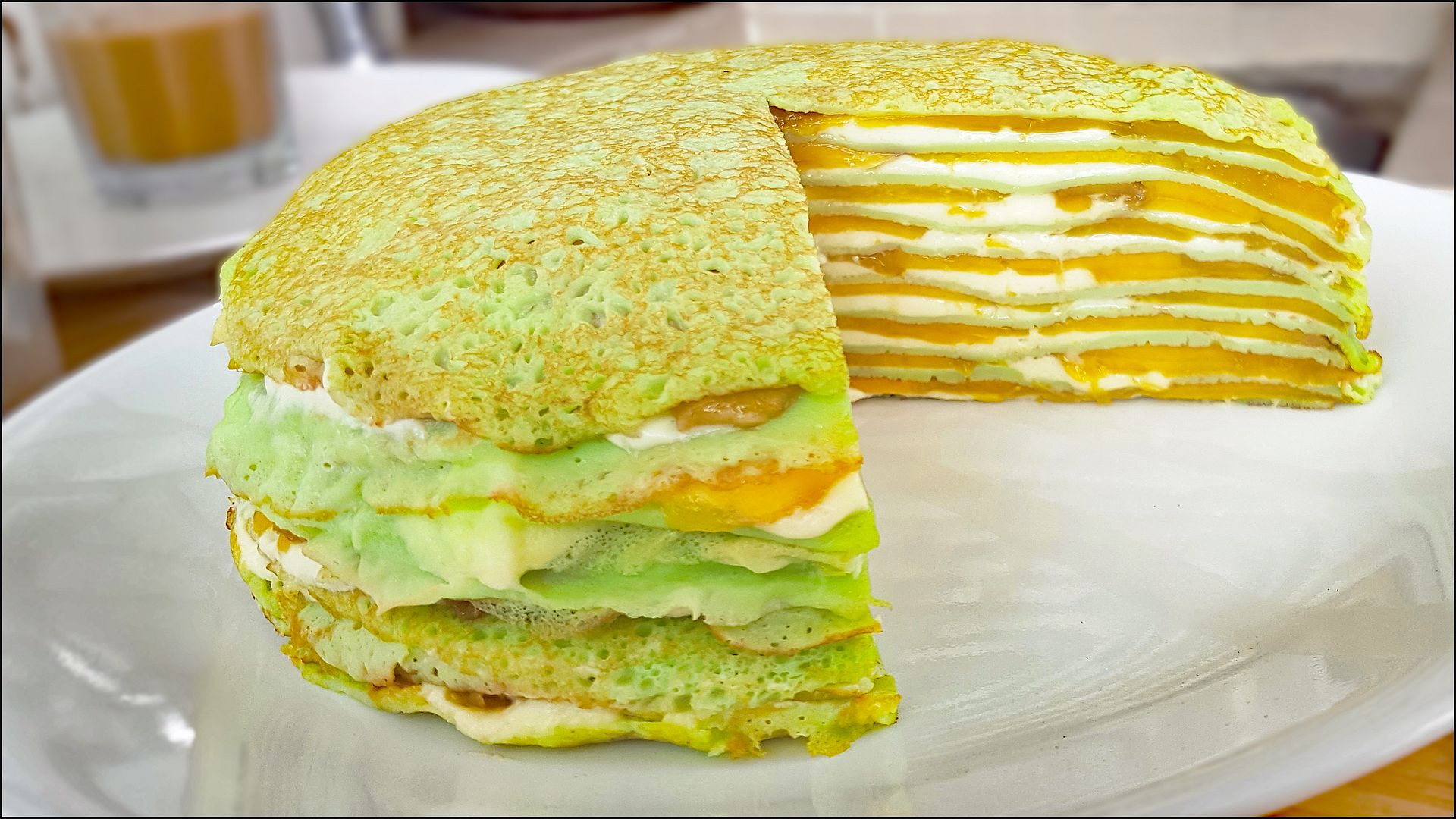 Crepes may be tough and rubbery. Or they may be soft and delicate, that they fall apart in the pan when you flip them.
Crepes may be tough and rubbery. Or they may be soft and delicate, that they fall apart in the pan when you flip them.What makes good crepes good, and bad crepes bad?
Gluten.
Batter with too much gluten makes rubbery crepes. Batter with too little gluten makes overly delicate crepes that tear easily. Making good crepes is about getting the right amount of gluten. Once you nail that, you win 50% of the battle.
What's the basic building block for gluten? Flour protein. Too much protein would create too
much gluten, and vice versa. The ratio of flour to other ingredients is crucial. And so is the type of
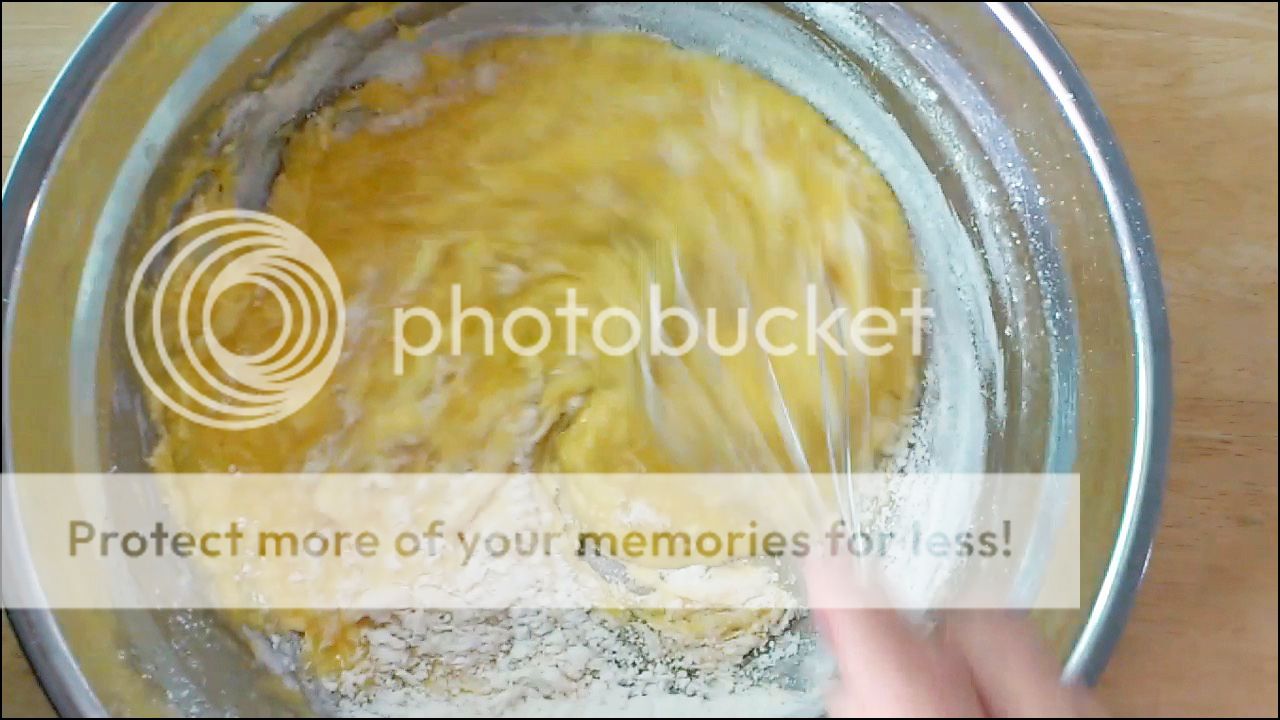 flour. Some flours have more protein; some have less.
flour. Some flours have more protein; some have less.The amount of oil and egg yolk in the batter is also important. Why? Because fat reduces gluten formation, so it has a big impact on how the crepes turn out.
How much should you stir the batter? Stirring increases gluten formation. When you're making the batter, mix just enough to make it smooth.
Frying crepes one by one takes time. As the batter sits, the flour in the mixture sinks to the bottom of the bowl. To keep it evenly mixed, remember to stir now and then. Otherwise, crepes made with
thinner batter will tear. And crepes made with thicker batter will be rubbery.
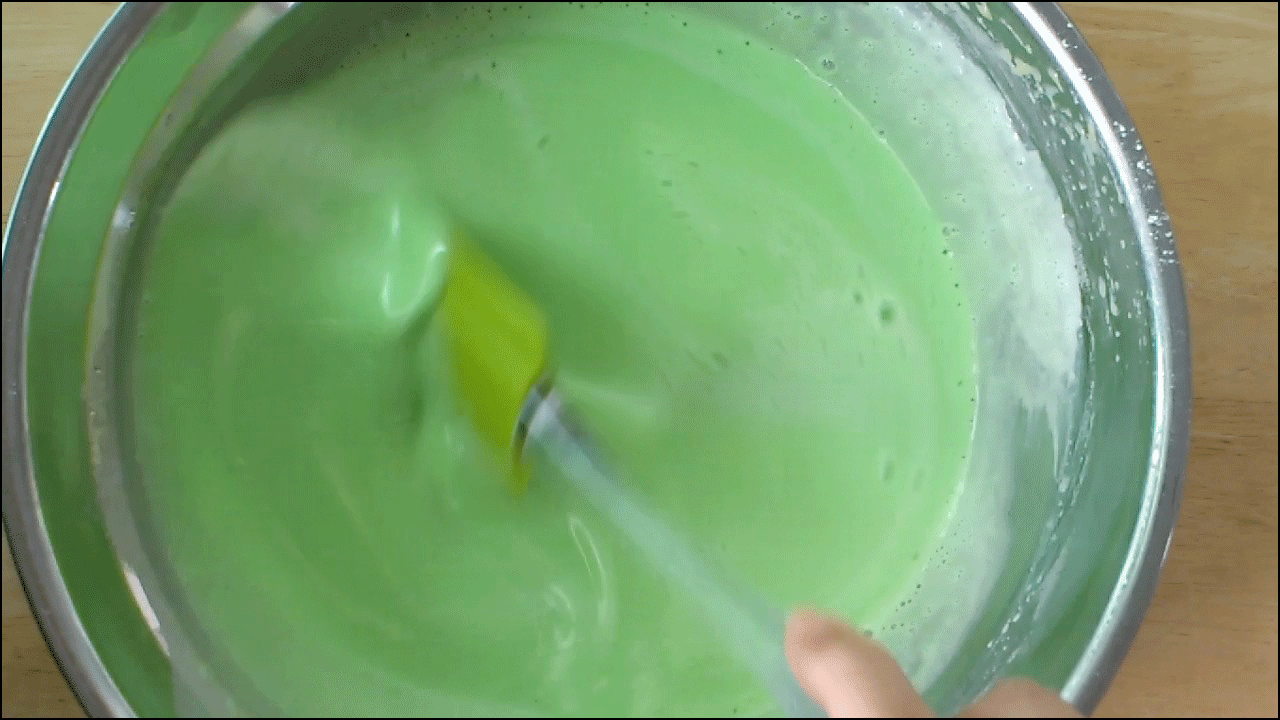 Most crepe recipes tell you to sieve the batter, and let it rest before frying. That's because there's a lot of flour in these recipes. Sieving reduces the amount of flour, because some of it sticks to the sieve. And resting relaxes the gluten. Without these two steps, the crepes would be rubbery.
Most crepe recipes tell you to sieve the batter, and let it rest before frying. That's because there's a lot of flour in these recipes. Sieving reduces the amount of flour, because some of it sticks to the sieve. And resting relaxes the gluten. Without these two steps, the crepes would be rubbery.My recipe is different from others. It has far less flour. The batter would have too little flour, and the gluten would be too weak if it's sieved and rested. That would make crepes that tear easily.
If you want crepes that have the right texture, flavour and look, getting the batter right isn't enough.
You must also get the heat right.
The pan must be hot enough. Why? Because heat turns the water in eggs and milk into steam, which
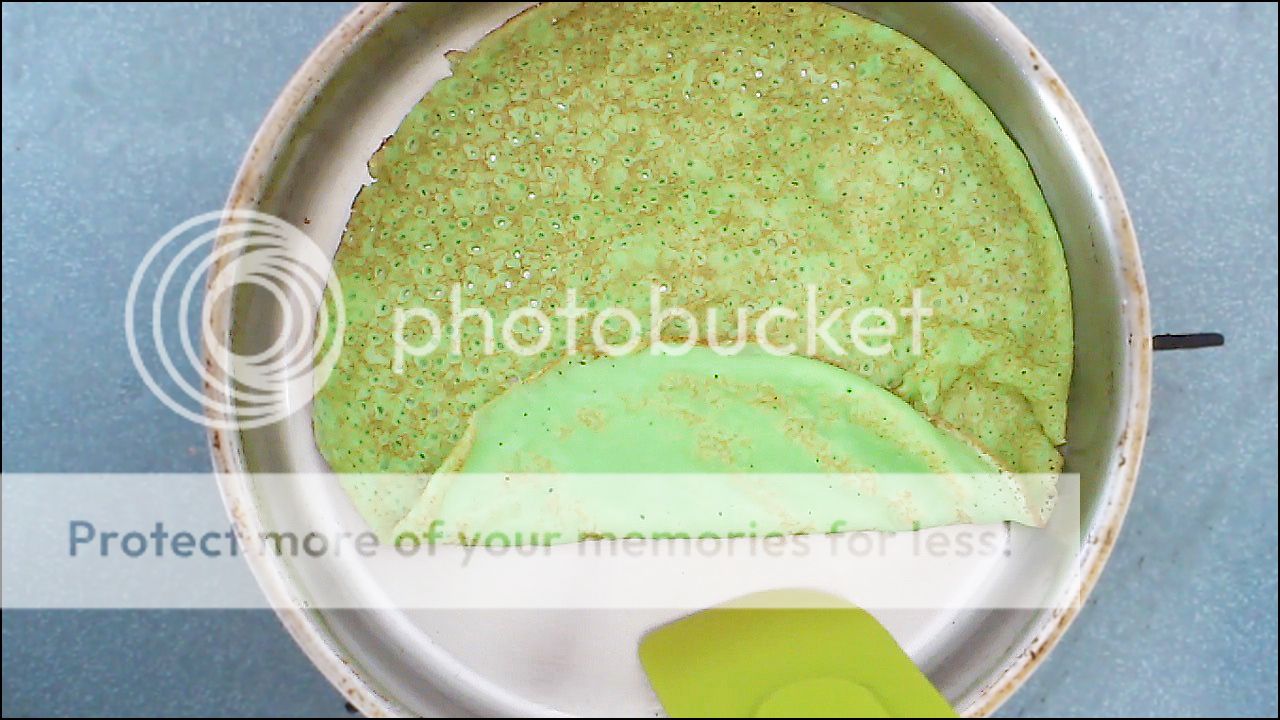 makes the crepes puff up. When crepes puff up more, they're softer.
makes the crepes puff up. When crepes puff up more, they're softer.Heat is also needed to turn crepes brown. The browning gives crepes a lacy look, and it enhances the fragrance of the crepes.
would be too thick. Thick crepes are tough. When the pan isn't too hot, there's time to swirl the batter into a thin layer before it sets. Good crepes are just thick enough to flip without breaking.
Turning a pile of crepes into mille crepe cake takes a lot of filling. If I fill my mille crepe cake with only whipped cream, that's way too rich for me.
 I need to lighten whipped cream with something. Pastry cream? Too much work. Durian? The fridge will smell for days. Strawberries? Too hard. Mangoes? Hey, bingo!
I need to lighten whipped cream with something. Pastry cream? Too much work. Durian? The fridge will smell for days. Strawberries? Too hard. Mangoes? Hey, bingo!Sweet and soft, mangoes go well with crepes and cream in both flavour and texture. The cheerful yellow doesn't hurt either. Who doesn't like colourful food?
Most people make about 20 crepes for their mille crepe cake. I do only 11. Why? Because I have a layer of mango between each crepe. That's adding 10 layers in total, so my cake isn't short at all.
Here's how I make my sunny, cheerful, and delicious mango mille crepe cake:
| MANGO MILLE CREPE CAKE (芒果千层可丽饼蛋糕)
(Recipe for one 16 cm cake)
Crepes (makes 11 pieces using 18 cm frying pan)  30 g sugar 30 g sugar100 g eggs 15 g egg yolk 30 g corn oil 60 g plain flour 200 g full-fat milk 1/4 tsp pandan paste lard for greasing steel pan
or corn oil if using non-stick
Filling 200 g dairy cream with 35% fat, cold 30 g sugar 1/4 tsp vanilla extract 3 mangoes, each about 250 g To make crepes 1) Mix sugar with eggs, yolk and corn oil till dissolved. Sift plain flour into mixture. Mix till even and smooth. Add half of full-fat milk. Mix till even and smooth. Add remaining milk. Mix till even and smooth. 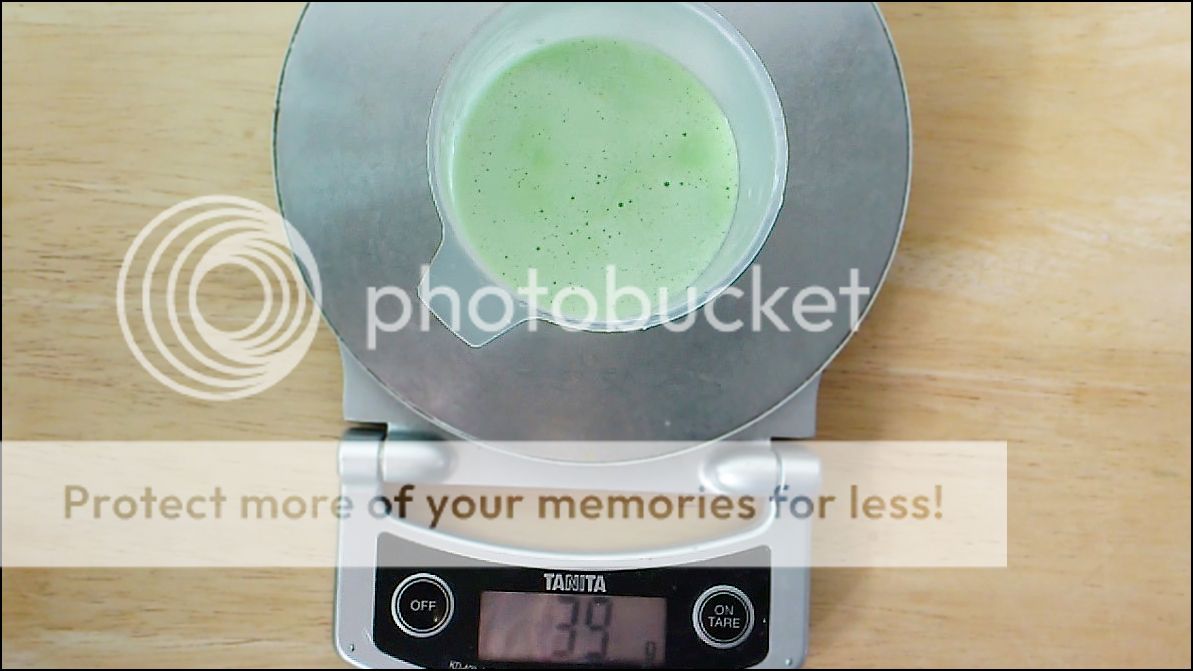 2) Heat 18 cm frying pan over medium-low heat till medium-hot (125-130ºC). Reduce heat to low. Grease pan lightly. 2) Heat 18 cm frying pan over medium-low heat till medium-hot (125-130ºC). Reduce heat to low. Grease pan lightly.3) Measure 39 g batter into cup. Pour into middle of pan. Swirl quickly to form even layer. Measure another 39 g batter into cup. Set aside. When crepe turns slightly brown around edges (takes about 30 seconds), loosen and flip with flexible spatula. Fry till second side is slightly brown (about 20 seconds). Remove crepe to plate. Repeat frying as before, making 11 crepes in total. Whilst frying, mix batter gently once per batch of 3-4 crepes. 4) Leave crepes till cool. Refrigerate till thoroughly chilled.  To make filling To make filling5) Whip dairy cream with sugar till thick. Add vanilla extract. Whip till cream is just stiff enough to stick to whisk. Place cream in fridge. 6) Peel mangoes. Cut into 1 mm thick slices. Discard peel and seeds. To assemble cake 7) Place 1 crepe on serving plate. Spread with 23 g whipped cream. Top with mangoes. Place another crepe on mango layer and repeat layering as before, making sure cake isn't lopsided. 8) Gently press top of cake with bottom of cake pan. Cover cake with pan. Refrigerate for about 12 hours. Serve. |
Comments
Post a Comment